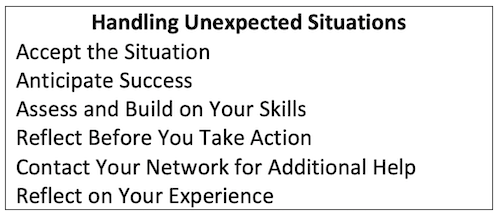How Leaders Can Cope With the Unexpected
By Ronald Williamson and Barbara R. Blackburn

Ron Williamson
School leaders hold one of the most unpredictable and uncertain jobs in our country. Every principal we know has dealt with the unexpected.
Despite the best organization and the use of a schedule, the day may become topsy-turvy at any time. It might be an urgent phone call, a disciplinary crisis, some inappropriate classroom activity, a visit from an upset parent, or the crash of the school’s online learning platform.

Barbara Blackburn
The past two years have added uncertainty to the job – rapid changes in expectations for student safety, building cleanliness, or even moves to and from remote learning. Changes often arise quickly, produce turmoil and instability, and need resolution.
So, how do you deal with the unexpected? We’ve culled advice from both educational and business resources and suggest these six steps (Cannon, 2022; Hunt, 2020; Vilhauer, 2016).

Accept the Unexpected
Some leaders cope effectively with unexpected events. That’s because they expect them to occur and have a plan for dealing with surprises. Some leaders actually enjoy the work of resolving new challenges. Others respond differently.
Unexpected events are just that, unexpected. One’s ability to deal with the uncertainty and ambiguity that goes with such events often shapes the response. You can’t prepare for every potential problem, but you can develop the capacity to respond effectively when the unexpected occurs.
Start with Your Attitude
As they say, attitude is everything. That’s certainly true when unexpected things happen. Life is full of surprises, and it’s important to acknowledge and accept that they are part of a leaders’ life.
A positive attitude always helps. Not all unexpected events are negative and not all are detrimental to your school’s purpose. Often unexpected events become an opportunity to solve a long-standing problem or deal with an issue that’s been neglected. Your attitude will shape how you approach the problem and the steps you take to deal with it.
Expect that everything will turn out well. When a leader expects the worst, they often act on those expectations. Unanticipated events, while unexpected, provide an opportunity to create a good outcome and a positive experience. While one’s attention may shift to the unexpected event, a successful leader quickly pivots to finding a solution and developing a plan for addressing the issue.
Trust Yourself and Your Abilities
When the unexpected happens, it is easy to focus on negative implications and how the event may alter your plans. Rather than doing that, the most successful leaders trust that things can and will turn out well. While they deal with something they didn’t anticipate, they trust their skills to develop a plan for addressing the problem and adjust as needed.
An unexpected event often provides an opportunity for leaders to demonstrate how they deal with pressure and to model the sort of response they want from others in their school or organization. Expect things to get resolved. Expect your plan to adequately address the problem. Expect success.
Pause Before Acting

Photo by JESHOOTS at unsplash
While some events may require immediate action, many benefit from taking a moment or two, or a day or two, to respond. The key is to be composed and have a considered response. Never panic and act rashly.
Successful leaders find that people are less inclined to cooperate if you don’t appear to be calm and in control. So, pause, think about the options, and develop a thoughtful plan.
Problems are most successfully resolved when the leader acts rather than reacts. Pausing and taking time to think before acting can minimize the likelihood of an emotional response, and will most likely lead to a better plan.
Nobody is perfect. That includes you and those you work with or serve. Part of a successful response is often forgiving yourself, and others, for things that they might have done differently. Don’t blame yourself or others.
Too often we spend time worrying about the reason something happened rather than working to remedy the issue. Focus on developing a plan, a remedy, rather than identifying or placing blame.
Consult Others
Leaders often think unexpected events require them to prove their leadership and act quickly. As we noted earlier, there is value in pausing before acting, taking time to gather facts and to put together a measured response.
But that doesn’t mean you must do that all by yourself. Solitary leaders are rarely successful. Collaborative leaders much more so.
Take time to consult with others. They may have skills or information that may help resolve the issue. Seek help and guidance when needed and don’t be afraid to ask for a second opinion. But never blame those you consult if the advice doesn’t prove helpful.
Over time, successful leaders develop a cadre of trusted friends and colleagues with whom they can talk, share issues, and seek advice. Unexpected events are often the right time to call on that cadre. You may want someone who will listen to your concern, ask clarifying questions, or offer honest advice about your plans.
Sometimes a one-on-one conversation isn’t appropriate. Many leaders maintain a journal where they reflect on events and comment on what has occurred. Referencing our reflection journals when the unexpected happens can be calming and reassuring and spark ideas that lead to solutions.
Evaluate and Learn
Finally, after every unexpected event, take time to reflect on what happened. Talk with trusted colleagues or journal your thoughts. Identify factors that contributed to the event, how you handled it, and ways it might be handled differently.
Use the reflection as an opportunity to recognize and expand your leadership skills and store away valuable advice for your future self.
Final Thoughts
Every unexpected event is not bad. Our initial reaction is often to see them as intrusive and disruptive. It can be hard to see them as an opportunity. That’s why it’s so critical for leaders to maintain a positive attitude, trust in their own skills, and take time to develop a thoughtful response to events.
References
Cannon, K. (2022). 8 Ways to Manage Unexpected Events and Keep Cool. The Coolist.
Hunt, S. (2020). A blueprint for dealing with the unexpected in work. Skills You Need. Retrieved at
Vilhauer, J. (2016). 4 ways to survive unexpected situations. Psychology Today.
 Dr. Ronald Williamson is Professor Emeritus of Educational Leadership at Eastern Michigan University. He is a former principal, central office administrator and executive director of the National Middle School Association (now AMLE). The author of numerous books on leadership, he is the co-author with Barbara R. Blackburn of Leadership for Remote Learning (2021) and 7 Strategies for Improving Your School (2020), both from Routledge/Eye On Education.
Dr. Ronald Williamson is Professor Emeritus of Educational Leadership at Eastern Michigan University. He is a former principal, central office administrator and executive director of the National Middle School Association (now AMLE). The author of numerous books on leadership, he is the co-author with Barbara R. Blackburn of Leadership for Remote Learning (2021) and 7 Strategies for Improving Your School (2020), both from Routledge/Eye On Education.
 Dr. Barbara R. Blackburn, a “Top 30 Global Guru in Education,” is a bestselling author of over 25 books and a sought-after consultant. She was an award-winning professor at Winthrop University and has taught students of all ages. In addition to speaking at conferences worldwide, she regularly presents virtual and on-site workshops for teachers and administrators. Barbara is the author of Rigor in the Remote Learning Classroom: Instructional Tips and Strategies from Routledge/Eye On Education.
Dr. Barbara R. Blackburn, a “Top 30 Global Guru in Education,” is a bestselling author of over 25 books and a sought-after consultant. She was an award-winning professor at Winthrop University and has taught students of all ages. In addition to speaking at conferences worldwide, she regularly presents virtual and on-site workshops for teachers and administrators. Barbara is the author of Rigor in the Remote Learning Classroom: Instructional Tips and Strategies from Routledge/Eye On Education.

































